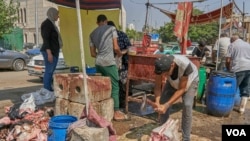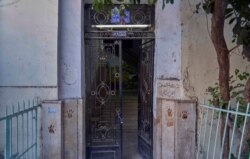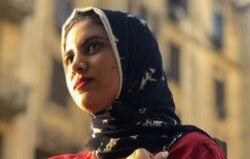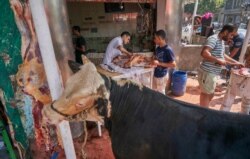During this year’s Eid al-Adha celebrations in Egypt, worshippers watched and listened to last year’s prayers on TV and the radio.
Public gatherings and in-person mosque services were banned. The government mandated that people who wished to slaughter livestock — the mainstay of the Islamic “sacrifice holiday” — should bring their animals to specific, regulated butchers.
Some people followed the new rules, others did not. Gardens, small butcher shops and sidewalk celebrations ran with the blood of sheep, goats and cows sacrificed in honor of the holiday.
“I wish we could pray in the mosques and travel to visit our relatives,” said Eslam Karam, 33, after a local butcher slaughtered a large white sheep in Karam’s garden. “But with the coronavirus, we are afraid to be in groups.”
The tradition is that after the sacrifice, the owner of the animal keeps some of the meat for his or her family and gives the rest to neighbors and the poor.
The holiday also marks the last days of the yearly pilgrimage to Mecca, another Islamic rite, known as the hajj.
On a livestream from Mecca in Saudi Arabia, pilgrims in surgical masks prayed spaced one or two meters apart. Normally, millions of Muslims attend the hajj. This year, only a few thousand were allowed.
So far, there have been no reports of a COVID-19 breakout from the hajj, but it generally takes about two weeks after an event to find out if participants were exposed. COVID-19 is the disease caused by the coronavirus.
Declining cases, ‘fear of second wave’
Coronavirus cases are still on the rise in Egypt, which recorded nearly 95,000 cases as of Aug. 3. But the rise in Egypt has slowed dramatically recently, with roughly 75% fewer new cases per day than last week.
In a coffee shop in downtown Cairo, Weam Mostafa, a 26-year-old photojournalist, said she fears the situation in Egypt may get worse before it gets better.
“It’s not under control,” she said. “The government did its best to put Egypt under the lockdown, but the Egyptian economy can’t stand more.”
Social distancing guidelines and protective masks never really caught on in Egypt, and the declining rate of new cases is making people less likely to protect themselves, Mostafa added.
“Implement some strict rules about wearing masks,” she suggested, “because the majority now are not wearing masks and not taking masks seriously.”
A third of Egyptians already live below the poverty line, and pandemic lockdowns have been devastating to almost every aspect of the country’s economy.
Many businesses have opened recently as Egypt begins to assess the damage, including movie theaters, which operated over the weekend while mosques remained closed.
“If mosques had to sell tickets,” the butcher joked, “then perhaps they would have been allowed to open.”









